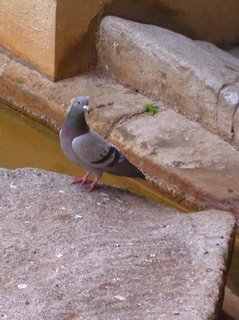
Bathing is not allowed in Bath, at least not in the Baths. Of course one look at the water would encourage a desire to shower. Somewhere else. During Roman rule this place was called Aquae Sulis after the local goddess who provided Britain’s only natural hot mineral spring, a real attraction for bath-loving Romans. They had the good sense to roof the place over so pigeons wouldn’t shit in it from morning until night, which the Victorians who rediscovered it twenty feet beneath a row of flooding houses in the 1850s did not. So you probably wouldn’t want to bathe where the Romans did, but the water that flows into the spring is clean enough to drink after 10,000 years of natural slow filtering since it fell as rain in the local hills - and before it gets exposed to the depredations of pigeons - and the British have been drinking and immersing themselves in that water since before they ever heard of Claudius or Julius Caesar. It has been rumored to cure any malady you can come down with. Finding the Roman incarnation of the place conveniently situated to the springs they were still bathing in was a bonus for the 19th century residents of Bath. Even now, after nearly everyone has stopped believing in the curative powers of the waters, about a million people a year still show up just to see the place. My glass of Bath water was free with my admission, so before I left I took myself to the Pump Room, where Jane Austen used to partake of the local social scene, and tried a glass. It was quite warm, having been drawn from a bronze fish’s mouth directly at the “King’s Spring,” a little mineralish, and not at all bad compared to London tap water.
Jane Austen lived here for five years, off and on, and never warmed up to the place. Even in 1801 it was full of tourists, being right between its height-of-fashion pleasure mecca period and its British-equivalent-to-Florida retirement mecca period. It was too noisy for a country girl, and too bright (white stone neo-classic buildings were all the rage), and she wanted to be back in Hampshire. The day I went it was also hot and crammed with shoppers, and I got lost a lot on account of the rather cavalier attitude towards street names on the tourist maps, but a pot of assam and a couple of crumpets with marmalade in the tea room on the top floor of the Jane Austen Centre in Gay Street kept me from expiring.
I was feeling a bit pensive, thinking about Jane’s too-short life, too much of which was spent in relative poverty after the death of her father. At least she didn’t have to die to be successful; her books were popular once they finally saw publication, and made her some money in the last six years of her life. I’m an avid fan of Jane’s – I can read Pride and Prejudice and Persuasion, particularly, every year or so, and still feel the same emotional suspense as I did the first time. That’s a gift: Jane’s remarkable gift, and her gift to me. “Here’s to you, Jane.” I raise my teacup in the general direction of Winchester Cathedral, where her headstone bears no mention of her slightly disreputable profession. “Here’s to you, old girl.”





0 comments:
Post a Comment